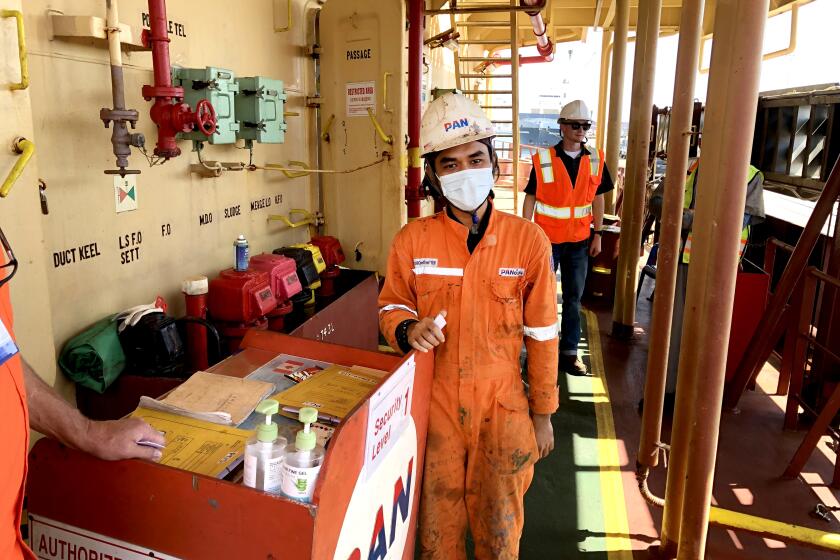Tech, healthcare stocks lead Wall Street indexes higher

Healthcare and technology companies led a broad rally for stocks on Wall Street on Tuesday as investors welcomed another batch of encouraging company earnings reports.
The Standard & Poor’s 500 rose 0.7%, the benchmark index’s fifth straight gain. The Dow Jones industrial average rose 0.6% and the tech-heavy Nasdaq composite gained 0.7%.
Among the tech sector winners were Apple, which rose 1.5%, and software maker Adobe, which added 2.1%. Johnson & Johnson, the world’s biggest maker of healthcare products, rose 2.3% after raising its profit forecast for the year after the release of strong third-quarter earnings.
“We’re starting to get more earnings in for the third quarter, and so far so good,” said Tom Hainlin, national investment strategist at U.S. Bank Wealth Management. “So far, the results are coming in, and we haven’t had a material downgrade in outlooks.”
They’ve been stuck for months on cargo ships now floating off Southern California. They’re desperate
On ships caught in the huge floating traffic jam off L.A., seafarers with scant access to vaccines have been stuck in limbo for months. Unions tell of despair and violence.
The S&P 500 rose 33.17 points to 4,519.63. The index is now within 0.4% of the all-time high it set Sept. 2. The Dow gained 198.70 points to close at 34,457.31. The Nasdaq rose 107.28 points to 15,129.09.
Small-company stocks also rose. The Russell 2000 index gained 8.07 points, or 0.4%, ending at 2,275.91.
The broad gains for stocks follow a mixed start to the week as investors continue monitoring corporate earnings for clues as to how companies will move forward through the year as they deal with higher inflation, global supply chain delays and the economic recovery slowing down.
“There was a nervousness going in as we started to see some supply chain interruptions,” said J.J. Kinahan, chief strategist at TD Ameritrade. “But the overall picture is still a fairly positive one.”
Those supply chain problems are going to have different effects on companies and industries, he said, including how they absorb the costs and whether they raise prices. Procter & Gamble fell 1.2% after saying it will raise prices as it faces higher commodity and freight costs.
The owner of Kip’s Toyland thinks he’s outsmarted the global supply chain gridlock that is threatening the holiday shopping season.
So far, however, higher oil prices and other costs haven’t cut severely into company profit margins, Hainlin said.
All told, analysts polled by FactSet are now forecasting earnings growth of 30% for the S&P 500, up from 23% in June.
The first exchange-traded fund to track Bitcoin futures rose 4.7% in its market debut Tuesday. Trading was very heavy for the ProShares Bitcoin Strategy ETF, reflecting the increasing interest in cryptocurrencies.
The ProShares Bitcoin Strategy ETF offers a potentially easier way for some investors to get into the fast-growing crypto world, though it invests in futures contracts for Bitcoin rather than the currency itself. The price of Bitcoin rose 4.5%, according to CoinDesk. It’s running about 1.2% below its all-time high of $64,888.99 per coin.
Bond yields moved higher. The yield on the 10-year Treasury rose to 1.64% from 1.58% late Monday.
Energy stocks gained ground as oil prices rose 0.6%. Exxon Mobil rose 1.5%. U.S. crude oil prices are up 73% for the year, and natural gas prices have risen roughly 81%. The prices have surged as the global economic recovery drives demand, and that is raising concerns about a global energy crunch.
Insurance company Travelers rose 1.6% after it handily beat Wall Street’s third-quarter profit forecasts. Other large companies, including streaming entertainment giant Netflix and United Airlines, reported their results after the market closed.
Several key earnings reports from airlines this week will also give investors a clearer picture of the effect of the surge in COVID-19 cases over the summer. American Airlines and Southwest Airlines will report their results Thursday.
Outside of earnings, the Commerce Department reported that U.S. home construction fell 1.6% in September as builders continue to be tripped up by supply chain bottlenecks. Shares of home builders were weaker. Beazer Homes fell 2.7% and Hovnanian Enterprises fell 3%.
More to Read
Inside the business of entertainment
The Wide Shot brings you news, analysis and insights on everything from streaming wars to production — and what it all means for the future.
You may occasionally receive promotional content from the Los Angeles Times.












